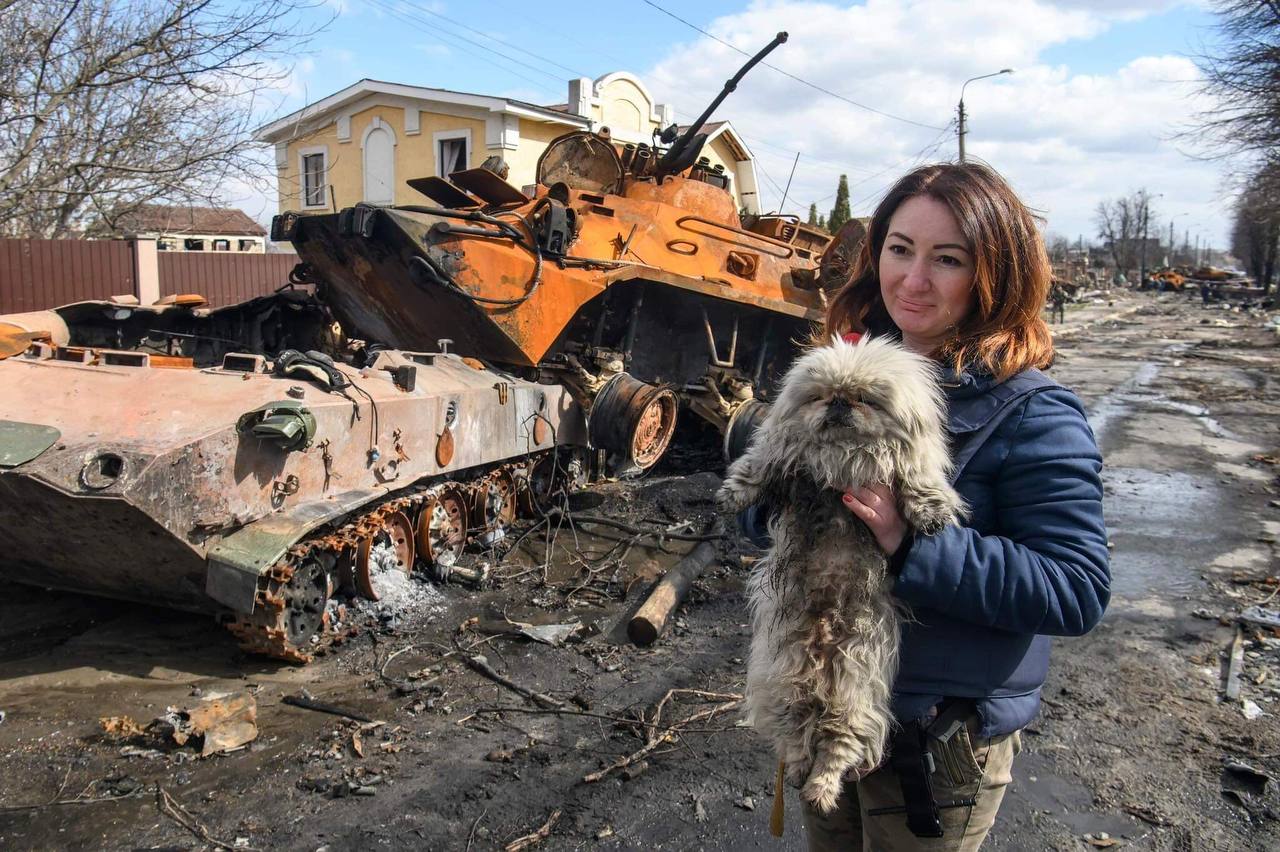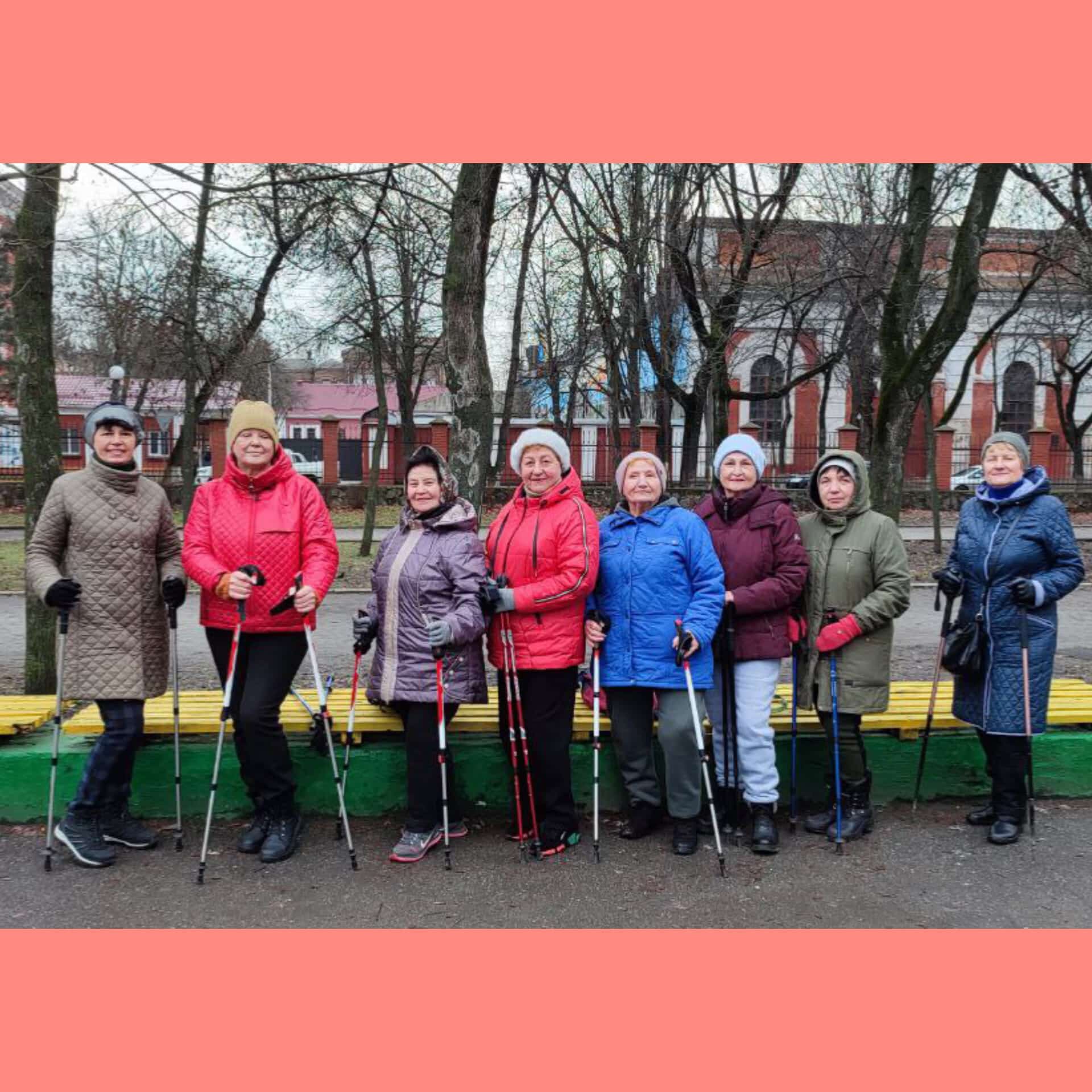Ukrainians in Bucha, Kharkiv, Chernihiv and other cities rescue not only each other but also cats, dogs and even ostriches.
We talked to four people who rescued their cats, dogs and ostriches from Kharkiv, Bucha, Chernihiv and Borodyanka about the difficulties in transporting animals, how pets handle the trip and air raid sirens sound.
Also, a veterinarian told us how to calm the animal during the war and take care of their mental health in stressful situations.
“I had to go with a dog through the whole city under the explosions.”
Before the full-scale Russian invasion, Iryna Lianna lived in Kharkiv. Nowadays, she is an entrepreneur. She also has 20-year experience in political PR. Iryna is the owner of a three-year-old Basset Hound Yari.
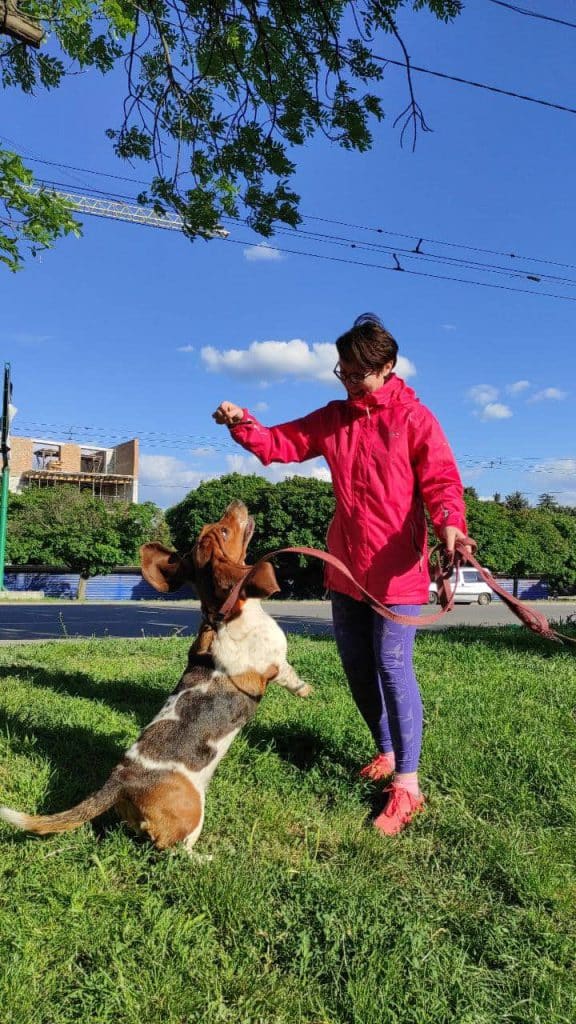
“We lived in Kharkiv in Saltivka district,” the woman recalls. “The sounds of shooting woke us up around 5 am on February 24. Everyone said it would start soon a few days before that, but I didn’t believe it till the last moment.”
Before the war, Iryna wrote a post saying that their grab-and-go bag consisted of 2 bags of dog food. Previously they ordered two bags delivered just two days before February 24.
Since all dog owners in their district in Kharkiv know each other, Iryna recalls that most animals, including Yara, reacted relatively calmly.
“The first two weeks while we were in Kharkiv, the air raid sirens didn’t work in our district. Therefore, we heard only explosions. When the explosions sounded far, we didn’t worry, but when they came closer, we hid in the corridor, considered a protected space,” — Iryna says.
Together with her family and the dog, Iryna slept in a corridor for the last few days. When Yara heard the explosions, she knew she should go to the corridor.
Problems started after the family decided to move to Poltava for a while. Iryna’s friend, a journalist, began to evacuate people. But how to take a dog? She needs food and her stuff in addition to transport. “Yara weighs 30 kg, and you just can’t hold her in your arms,” — added Iryna. The second difficulty was how to get to the point of departure because you had to go through the whole city under fire.

But fortunately, according to Iryna, the dog behaved calmly during the trip. Yara was on the bus with ten other cats in cat carriers. “Before leaving, we had half a bag of pet food left,” — the woman recalls. We called a friend who had a beagle and gave it to him. At that time, there were already difficulties with pet food in Kharkiv.”
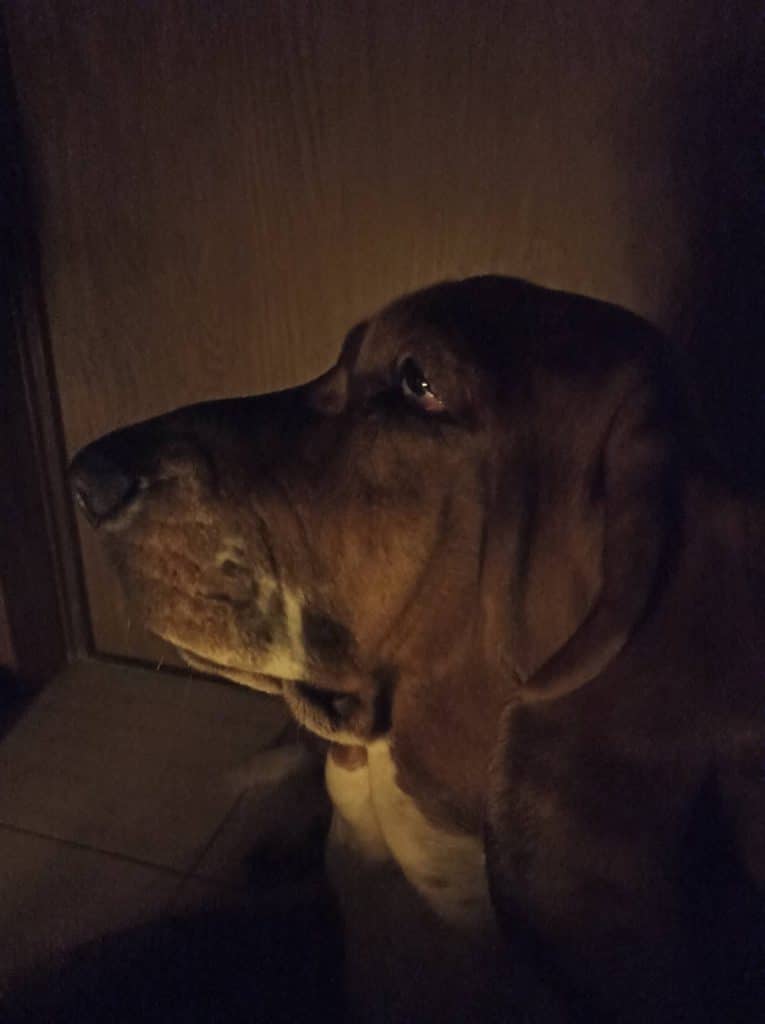
After coming to Poltava, Yara fell ill. “There was no heating in our apartment in Kharkiv, and the temperature was 13 degrees Celsius,” says Iryna. “The veterinarian said that this could have caused the disease. Or it could have been caused by stress.”
The dog’s owner says that when the family was in Kharkiv, they gave Yara a sedative to calm her down. “Now, when there are air raid sirens in Poltava, I just pet her and give her some treats, ” says Iryna. Then the dog is immediately distracted. 2-3 minutes before the sirens, Yara often either goes to the bathroom by herself or wakes up and goes to our door.
Iryna also helped friends with pets who stayed in Kharkiv. In particular, she bought and sent cat carriers, medicines, and pet food. “My acquaintance from the village of Tsyrkuny, near Kharkiv, was under fire for some time with her cats and the neighbours’ animals she was taking care of,” added Iryna. Volunteers were not allowed to visit them last week. The other day she called me and said the parcel with pet food, which we had sent before, finally arrived.”
Yara and her owner are hiding in a corridor from the shelling
“The search for the cat lasted for two weeks.”
Natalia Katashynska is originally from Kyiv. She is a manager of educational and cultural projects. Before the full-scale invasion, she went to Transcarpathia on a short vacation to go skiing. She was supposed to return to Kyiv on February 25 or 26, but it was no longer possible because transport was cancelled in the direction of the capital. So, Natalia moved to a friend in the Ivano-Frankivsk region and lived there for the first few weeks. At home, in Kyiv, a cat Sirius and a dog Muffin were waiting for her.
“When I go on a trip, I always ask friends or acquaintances to take care of them. Just in case, I had three pairs of keys to my apartment in different parts of the city. On February 25, one of my friends handed over the keys to other acquaintances on Bohatyrska Street, where a firefight broke out 15 minutes later,” says Natalia.
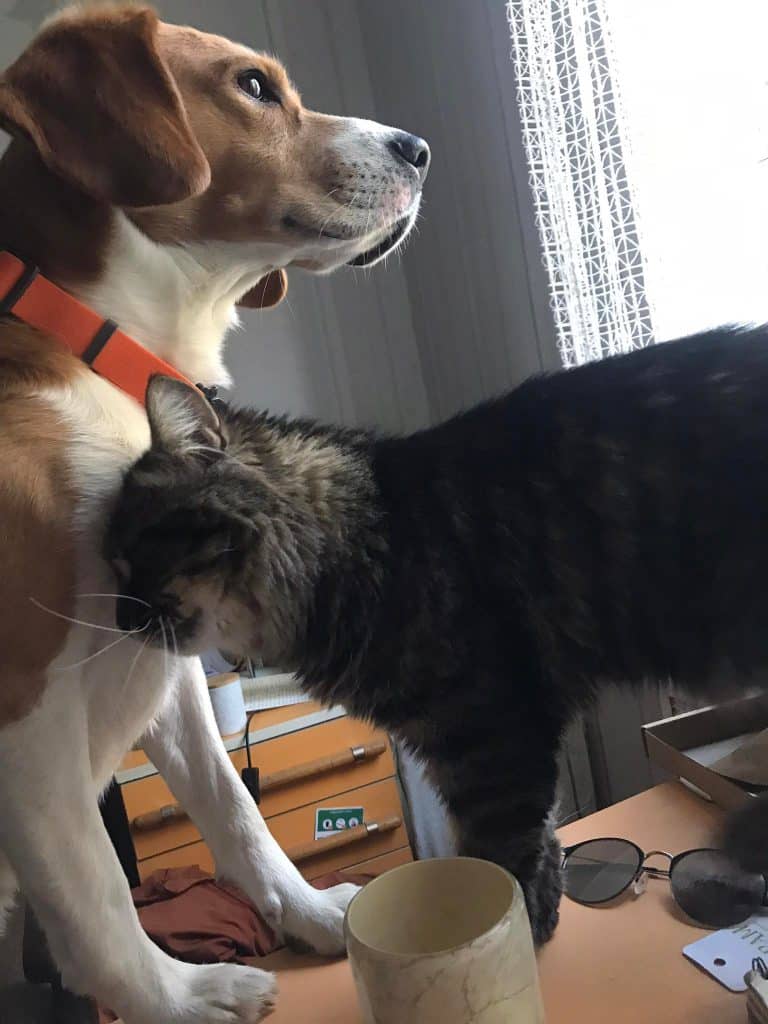
The dog and the cat were left alone at home, and Natalia worried about them. She even wanted to take BlaBlaCar to return to Kyiv, but her friends and family talked her off. “The cat and the dog were living alone for a week,” the woman recalls. I asked my friends to close my pets in the corridor and the bathroom. The cat settled in the sink. He is terrified of loud noises, so the sound of sirens has a traumatic effect on Sirius.
While evacuating from Kyiv, friends were supposed to take her pets from the city. At that time, it was problematic because there was no space in the vehicle even for people, so only a cat could fit in the car, and the dog stayed in Kyiv. “Sirius doesn’t like strangers, loud sounds and cars,” Natalia shares. “It so happened that all this came together in the trip. When the family that took him away stopped near Kamianets-Podilskyi, Sirius escaped.” So Natalia travelled to the village of Slobidka-Humenetska for 7 hours, looking for a cat in the snowstorm, but in the end, she couldn’t find him.
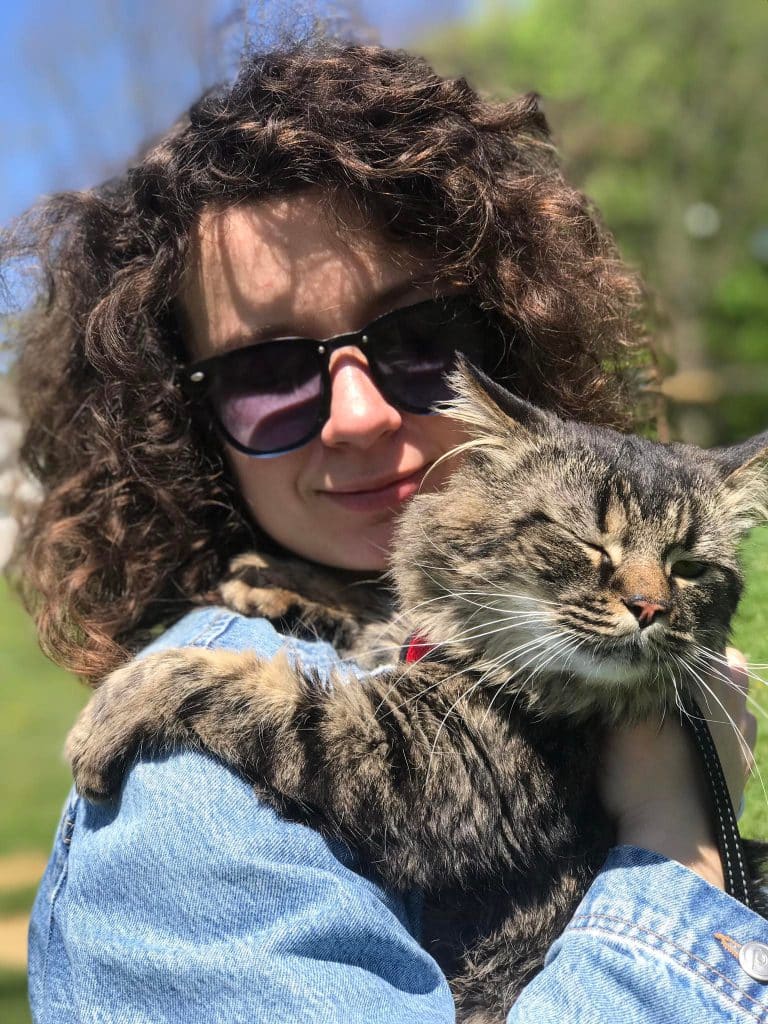
“It was my first tantrum that week,” she recalls. Then we announced a search for a cat. My friend Olena Pavlova, who placed a notice about a missing cat on a page of the cat Inzhyr, helped a lot. One of the fans of the cat responded immediately. She printed many posters and hung them all over Kamianets-Podilskyi. It was a real search operation that lasted continuously for two weeks.”
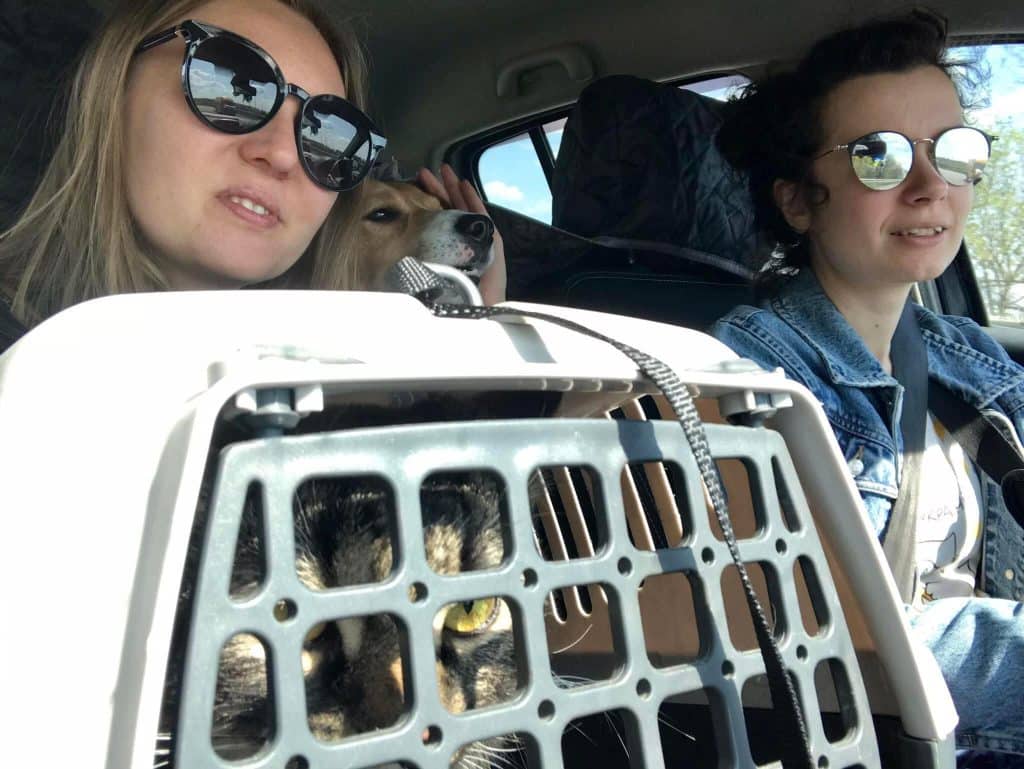
Later, Natalia had to go to Rivne, where friends sheltered her. “On March 31, I got a call and was told that my cat had been found,” the woman said. I couldn’t believe it because he had been missing for 26 days! People said they saw him on the first day, but a shepherd was jumping near the cat, so they didn’t think Sirius was still alive. When Sirius was found, he weighed less than 2.5 kg (usually 5 kg) and was dehydrated, with wounds on his paws.
Now Sirius has become more gentle and brave. When Natalia hears the air raid sirens, she takes the cat to the corridor and holds him in her arms because it is enormous stress for him. “And the dog reacts calmly, even when we have a walk and hear sirens,” the woman adds. “Apparently, he copes with stress better than all of us.”
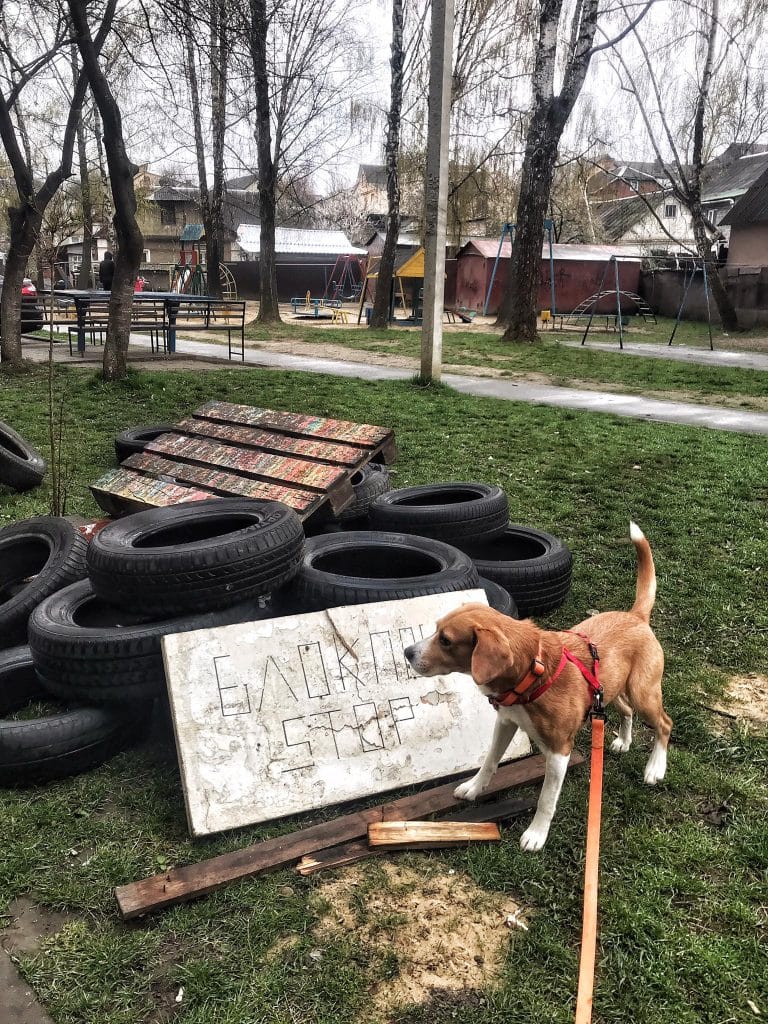
“I found a shelter for 13 dogs, 4 cats and an ostrich.”
Yulia Kyrienko works as a TV journalist and covers the war in Ukraine. “When Bucha and Irpin were released, we went to film it, and on the first day, I took three dogs out of there. I found a white Pekingese on Vokzalna Street. He looked more like a piece of black rag. He was dirty, coved in fuel oil. We also met a woman there who had an Alabai nursery. She admitted that the animals had nothing to eat and offered to take a few of them. I brought them all to the newsroom, where several found home immediately, and I took the Pekingese.”
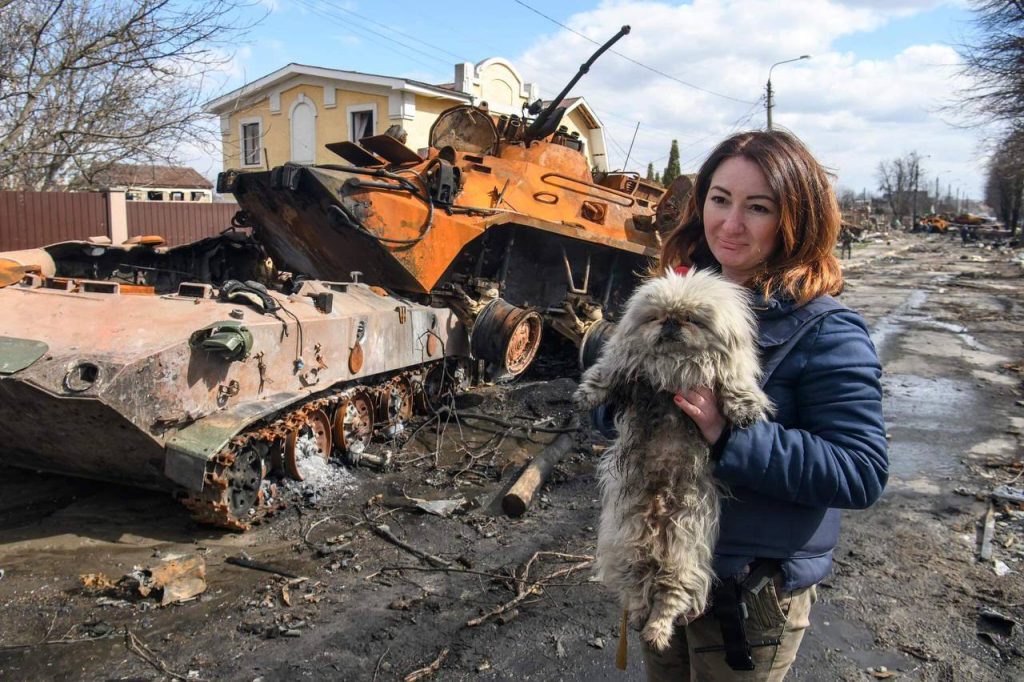
That’s how it all started for Julia. The woman published a post to find a home for a rescued Alabai and found new owners just in a few hours. She says those people are still happy, send photos with a new pet and are delighted that they have a dog.
“The next time we went to Bucha, we brought more than a hundred kilograms of dog food and gave it to a woman who had a dog nursery,” says Yulia. We took 5 puppies and 7-8 big dogs from the nursery. On the way back, I accidentally found another shepherd. Lately, I found a home for her too.
While filming in Borodyanka, Julia found a beautiful cat that ran out of a broken-down apartment. “She was starving,” the journalist recalls, “so I started feeding her.” And then we realized that she had kittens there, so we took all of them. All the kittens had been succesfully adopted.
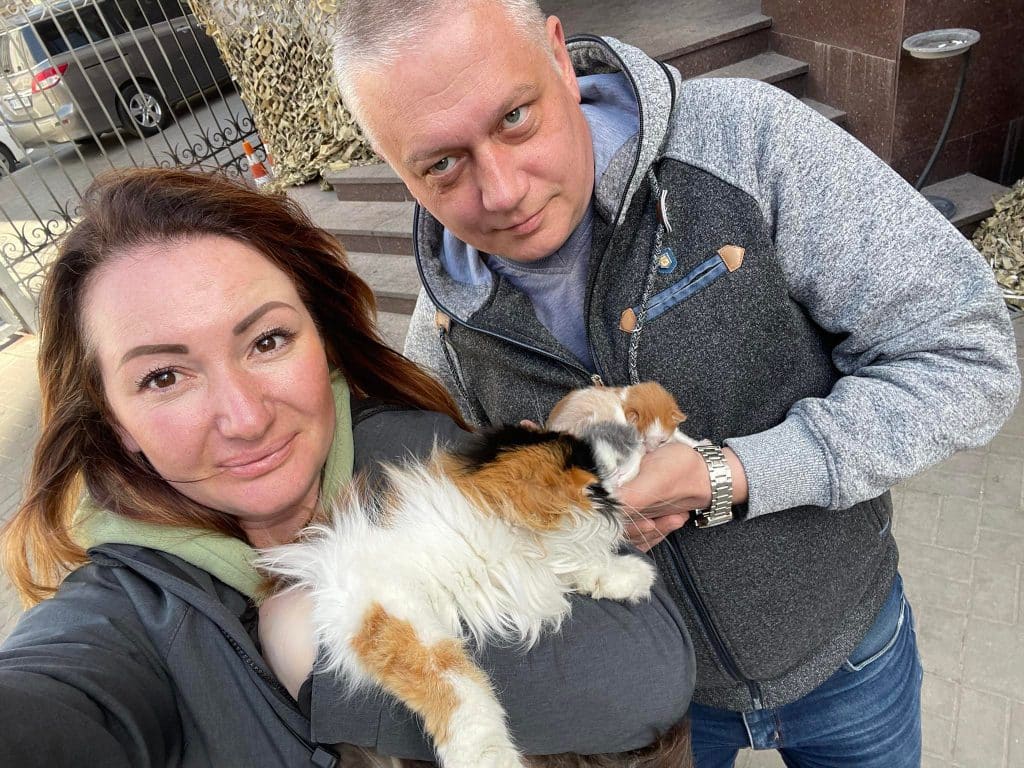
English bulldog Frankie and Pekingese Butch live in Julia’s house. Recently, they also took a camouflaged cat Volodymyr, whom the journalist’s husband found near Brovary.

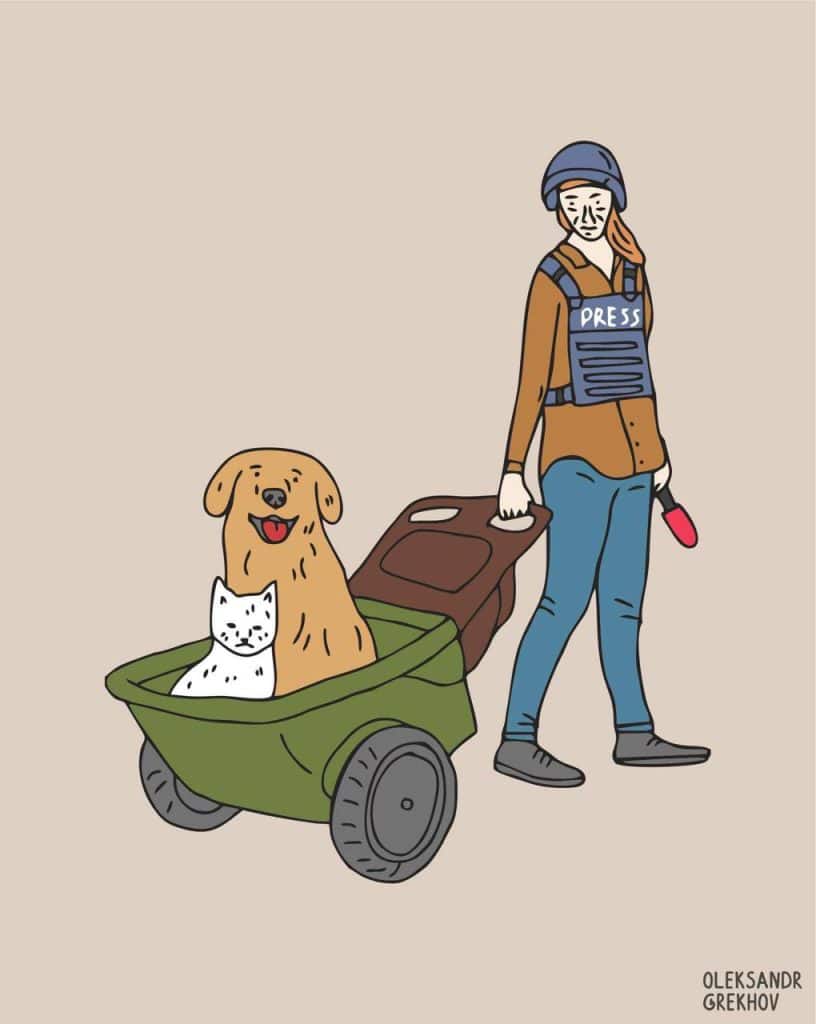
“I was on a business trip to Donbas,” says the journalist, “and I had no one to stay with the Pekingese, so I took him with me.” At home, he usually sleeps in his bed. But when we were in the East, there were constant explosions, so the dog slept under the bed. That is unusual behaviour for him. When he spent a month in Bucha, he kept hearing the cannonade, and he obviously remembered this sound.” Julia says that on February 24, when her neighbour’s dachshund heard the shelling, she died of a heart attack. “After all, dogs feel the behaviour of their people,” adds Julia. “There are situations when they can’t stand these shellings and run away.”
Generally, Julia managed to find a new home for 13 dogs, 4 cats and 1 ostrich.
“There was an ostrich farm in Borodyanka district,” the journalist said. “When the full-scale invasion began, the farm was under fire, and many animals were killed. A lot of animals were eaten by Russians. One ostrich, which lived in the occupation for a month, managed to escape. My colleague Andriy Tsaplienko found him. I quickly organized people to help catch and take the bird out. The ostrich’s name is Hook. He now lives in Mezhyhirya Zoo and even has a girlfriend.”
“The cats were with us in turbo mode: go, survive, endure, but get to your destination.”
Svitlana Fedeshova is originally from Lviv, but she has been working at Taras Shevchenko Music Drama Theater in Chernihiv for 7 years. With the start of a full-scale Russian invasion of Chernihiv, she had to leave the town.
“I have two cats: a boy and a girl,” says the woman, who spent 8 days in a bomb shelter. “At first, we took animals up and down, but lately, we realized that it was impossible because air raid sirens became more frequent and the danger increased. So we moved to another bomb shelter and lived there with cats. We went out of the bomb shelter only to take some stuff from home and go to a store.”
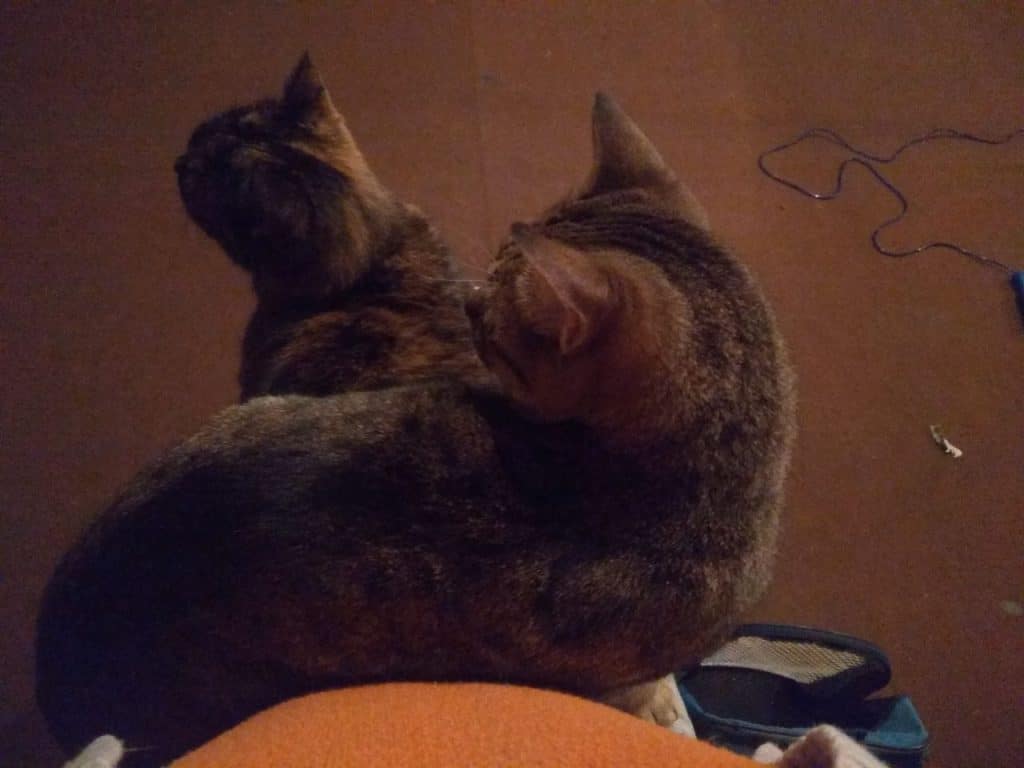
When there was a chance to leave for Lviv by car, Svitlana and her family decided to go. “It was very risky,” the woman recalls, “because information about mining recently appeared.” The next day, a family blew up on the road we chose. When we were on our way (5 people, 2 cats and pregnant me), they fired at someone’s car behind us.”
The road trip to Lviv took us 3 days.
“Cats were sitting in pet carriers almost all the time,” says Svitlana. “I was afraid they would disturb the driver. But the animals sat bravely, only occasionally expressing their dissatisfaction.”
The first night Svitlana and her family stayed in Kaniv. Volunteers found shelter for them in the kindergarten. “I remember the anxiety, the night, the cold,” she said. “I asked for a separate room so we could let the cats out, and they found it for us.” At night I was looking for scotch tape to fix the carrier because no one had a needle and thread. I was worried that the cat would jump out of a car on the way, and we would never find him again.”
Then, the family reached Vinnytsia, where some strangers hosted them. “The owner of the apartment was allergic to cats,” recalls Svitlana, “so they had to spend the night on the balcony. The animals were stressed all night.” On the third night, the family arrived in Ternopil, where they spent the night at the theater.
“As a pregnant woman, I get a separate dressing room with a sofa,” the woman recalls. “The cats slept nearby and were very happy about it. In the morning, when he had to leave, cats hid and didn’t want to go out. That’s why my husband and I decided to catch them. We lay down on the sofa and pretended we were not going anywhere. That’s how we managed to put cats in their carriers and went to Lviv.”
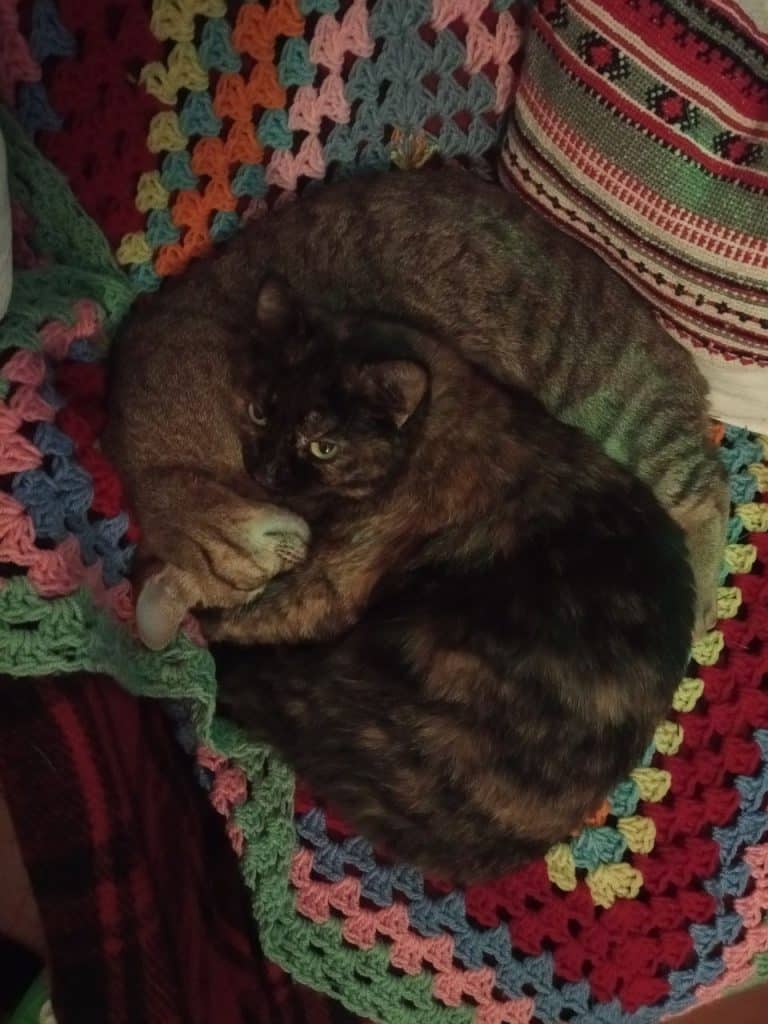
Svitlana is glad that cats understand where their toilet and bowls are. “The cats were with us in turbo mode: go, survive, endure, but get to your destination,” the woman says.
The road was very difficult for the animals, although everyone in the car was in such a state that no one paid attention. In Chernihiv, the animals were also very anxious. “Especially when there were explosions nearby,” says Svitlana. “Cats began to howl very actively and somehow strangely. Now in Lviv, they are much calmer, and so are we. Despite the anxiety and sense of danger, it’s much better than in Chernihiv.”
How to calm an animal in a stressful situation?
Veterinarian Olga Kulinich from Rivne says that stress manifests itself in animals in the form of inappropriate behaviour.
“Your pets may start biting,” she says, “scratching, refusing to eat, running away, there may be urinary or faecal retention. If you notice any changes in your pet’s behaviour, consult a veterinarian if possible.”
What to do at home? If sedatives are available, start giving them to your pet. The doctor emphasizes that if it is human medicine, it is necessary to consult a veterinarian. A calm tone can help. Also, don’t forget to pet your animal.
If you move to another place, be sure to take a blanket or something that smells familiar, and then the animal will be calmer. Grab his or her favourite toy. It is a good method to distract your fluffy friend.
Olga Kulinich advises periodically to give your pet treats. At the same time, make sure your pet doesn’t overeat and drinks enough water.

